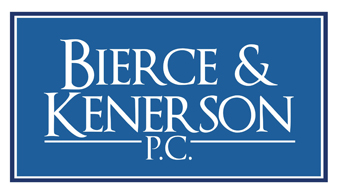A webinar offering CLE Credit
Tuesday, December 6, 2011, 11 A.M. – 12:20 P.M. Eastern Daylight Time U.S.
Speakers:
- William B. Bierce, Esq., Bierce & Kenerson, P.C.
Description:
This is an advanced seminar for experienced corporate and commercial lawyers looking for a different perspective on how LLC’s can be structured and governed.
As a form of legal entity, LLCs enjoy unique U.S. tax benefits that make them well-suited to service industries, including IT-enabled businesses, particularly “sweat-equity” type services and Internet-based businesses that do not require heavy initial investment. They are disfavored by venture capital and private equity investors due to legal and tax considerations. However, without private equity, LLCs can serve as platforms for rapid growth in business without substantial investment capital. Thus, LLC’s offer comparative advantages for service-oriented and Web-based businesses, such as (for example)
- global business services;
- importers selling goods through a service-based sales operation;
- foreign companies expanding into the U.S.; and
- American marketing, service and customer-relationship teams seeking to joint venture with foreign service delivery providers for a global services business.
This webinar will address the fundamentals of structuring LLCs for use in special purpose environments. It will help lawyers understand key legal and tax issues in such environments for tax-efficient operations.
Relationship Paradigms. The webinar will consider specific operational and governance paradigms, particularly:
- 50/50 joint ventures;
- Sweat-equity businesses whose growth depends on Internet technologies (such as “cloud computing” and “software as a service”) as well as hands-on services by entrepreneurial employees, contractors and other service providers.
Sweat-Equity Businesses. Sweat-equity businesses depend on incentive compensation structures. This webinar will identify and provide a roadmap for using “membership interest options” and “profit interests” in LLCs as incentive compensation. Such approaches are particularly important in today’s current economic climate, where venture capital and bank financing impose significant challenges.
Operating Agreement Structure. To frame the structural and operational issues, this webinar will consider basics for capital structure, incentive compensation, admission of new members and governance.
Legal Structures for Collaboration in Strategic Relationships: Contracting (Supply Chain and Outsourcing) vs. Entity (LLC) . To frame the strategic relationship issues, the webinar will also present a comparative analysis that draws on experience from building strategic alliances in the supply chain. Today, “collaboration” and “social networks” are transforming business models and redefining the “extended enterprise” to include employees, non-employees and suppliers. The webinar will provide a unique view by an expert on outsourcing:
- when should an LLC be considered for a strategic alliance,
- how should external resources be harnessed (by contract or by LLC operating agreement) to offer a constellation of managed, monitored and integrated business processes, and
- how lessons from governance of LLCs and governance of external service providers can deliver mutual benefits, mutual alignment and mutual growth.
Lessons learned will also include discussions about exits from failed LLC operations, and how to plan for unwinding through effective planning at the start.
Who Should Attend:
- Entrepreneurs
- Attorneys (corporate, ICT, commercial, tax and international)
- General Counsel
- CEO’s and COO’s
- Angel Investors
- Venture Capitalists
- Private Equity INvestors
- Foreign Investors
- Investment Bankers
- Strategic PLanners
- Human Resource Executives
This webinar is free of cost. Kindly contact lsanfiorenzo@biercekenerson.com if you would like more information.
To register for this webinar please click here.
This course has been approved in accordance with the requirements of the New York State Continuing Legal Education Board for a maximum of 1.5 credit hours, of which 1.5 credit hours can be applied toward the Areas of Professional Practice requirement.
